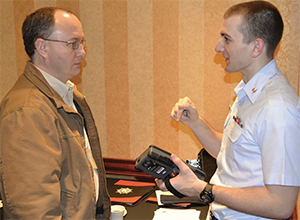Exemptions added to the U.S. Coast Guard’s final rule for Transportation Worker Identification Credential (TWIC) card readers are a welcome reprieve, according to maritime industry leaders.
In August, the Coast Guard set a two-year deadline for certain vessels and facilities handling dangerous bulk goods to install TWIC readers — electronic devices that verify the identity of individuals who require unescorted access to secure areas. Included in the rule were changes eliminating the need for readers at barge fleeting facilities and exempting vessels with 20 or fewer TWIC-required crewmembers. Previously, the proposal applied to vessels with 14 or fewer crewmembers.
Industry feedback prompted the changes, according to the Coast Guard. Operators and owners argued the readers were prohibitively expensive — on average costing from $5,000 to $7,000 each — and weren’t feasible or necessary for certain facilities.
Barge fleeting facilities will no longer be automatically required to install the readers. The adjustment was made in large part because many fleets are only accessible by water and lack the infrastructure to support TWIC readers, said Coast Guard spokeswoman Lt. Katie Braynard.
“There are a lot of fleeting facilities (in) rural areas and not many of them have shoreside access,” said Caitlyn Stewart, senior manager of regulatory affairs for the American Waterways Operators. “Most of them can only be accessed by vessel from the water and, unlike a busy port where you have lots of folks moving in and out, there’s not a lot of permanent infrastructure.”
Stewart said the individuals accessing these facilities are often pre-screened; many have already been TWIC-verified upon entry to their vessel. Fleeting areas aren’t completely exempt, however.
“If a barge fleeting facility handles or receives CDC (certain dangerous cargoes) in bulk, it would be considered to be a Risk Group A facility, and would be subject to electronic TWIC inspection requirements,” Braynard said.
A requirement exempting vessels with 14 or fewer TWIC-required crewmembers was scaled back in the final rule to apply to those with 20 or fewer crewmembers, a provision that largely affects passenger vessels.
“We are delighted that the Coast Guard has supported PVA’s long-held position that TWIC readers are unnecessary for the vast majority of passenger vessel operators,” said Margo Marks, president of the Passenger Vessel Association. “We strongly believe that current industry security measures are effective in protecting passengers and crew and we are pleased that the Coast Guard agreed with us.”
Braynard said the adjustment was based on industry input and the belief that outsiders would be recognized by a crew of 20 or fewer.
“(The Coast Guard) feels it is an appropriate crew size at or under which all crewmembers will be able to quickly identify people who do not have unescorted access to secure areas,” Braynard said. “We realize this may be a conservative figure, and that there is no hard number at which all crewmembers will recognize each other by sight.
“Nonetheless, we believe that the figure of 20 crewmembers presents a reasonable threshold at which all members of the crew can be realistically expected to recognize one another.”
Because of the revision, only one U.S.-flagged passenger vessel will be required to use TWIC readers — an oceangoing cruise ship that operates in Hawaii, Marks said.
The final rule also provides additional flexibility with regard to the purchase, installation and use of electronic readers. Instead of requiring the use of TWIC readers that are on the Transportation Security Administration’s qualified list, owners and operators can integrate TWIC inspection and biometric matching into existing systems.
The deadline for required vessels and facilities to implement readers is Aug. 23, 2018. Potential penalties for facilities not in compliance by this date will be determined on a case-by-case basis by the local captain of the port, Braynard said.

